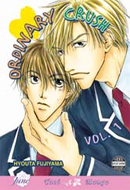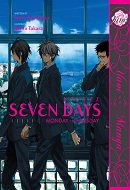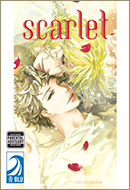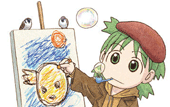   |
Manga-ka: Hyouta Fujiyama
Publisher: DMP/June
Rating: Mature (18+)
Released:
Synopsis: “Welcome to Kinsei Private School – a respected, all-boys institution where it’s rumored ninety percent of the student body is gay (or bi). For the straight Nanase, this means constantly evading day-to-day advances from his love-struck classmates. Just what is a “normal” boy to do in this sea of “abnormality?”
Nanase’s solution to his private school woes is to go along with the plan suggested by his upperclassman, Heiji, who suggests the two of them pretend to date. Now throw in the fact that Heiji is already crazy for Nanase along with other students who aren’t willing to let Nanase go that easy. To make matters even more complicated, or in the case of a yaoi, simpler, Nanase finds himself acting in love with Heiji a little too passionately and thus it doesn’t take much thought to see where this is going.
Ordinary Crush is a basic following of Nanase’s schooldays as the most sought after single, until he begins ‘dating’ Heiji of course. It doesn’t take him long to realize Heiji’s feelings and his own in return. Their truthful love affairs surface only a mere one chapter into the book so the rest of the book deals with Nanase coming to terms with what these feelings imply. The plot is stereotypical and doesn’t present any new spin on the concept but the characters manage to keep this yaoi afloat.
Nanase has some amusing dialogue as he overreacts and under reacts to things in a way that catches everyone off guard. Often the assumptions yaoi readers, and characters alike, have are turned back on them with some surprising, or at the very least amusing, responses. His energetic and unique responses aren’t over the top and serve well to keep Orindary Crush from becoming another over-dramatized teenage angst-fest.
The second half of the book begins to focus more on characters that were initially secondary to Heiji and Nanase. Though before viewed as the closest things to villains in this book, readers are shown the small cast from a different angle and may find them more interesting than the book’s main characters. As a bonus, one of the short stories at the back of the book is a stand alone separate from the school lives of the cast. It’s about a man and a robot he finds himself living with. It stands out as a very thought-provoking piece, that while not exactly boys’ love, still fits nicely into this release.
The artwork in Ordinary Crush is pretty solid and uses sharp, strong lines. Readers who prefer more masculine looking characters will enjoy Hyouta Fujiyama’s stronger character features with no characters coming across as too feminine. Some problems with telling characters apart can occur at times with similar designs but all the focused-on cast are diverse enough that this isn’t an issue.
Ordinary Crush was a fairly absorbing read the first time through but had few substantial or unique enough attributes to warrant much reread value. The characters were interesting, and readers may find themselves curious to see where budding relationships lead in volume two, but for those who can’t get attached to any of the cast, may find little else here. A good quality release from DMP with some entertaining quirks, Ordinary Crush is worth giving a shot but may not prove to have enough oomph for everybody.
Written November 17, 2007 by Lissa Pattillo for MangaJouhou
Book provided for review purposes by Digital Manga Publishing


 Follow
Follow
























